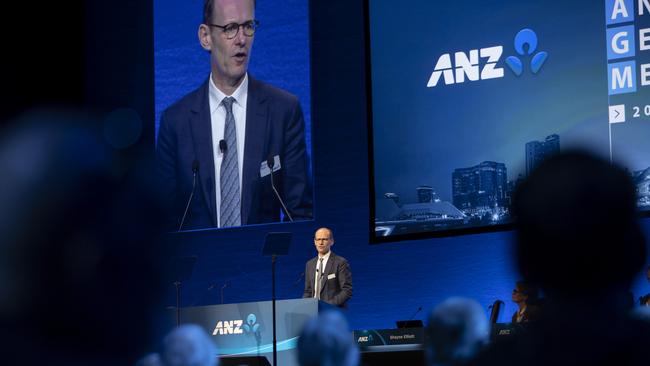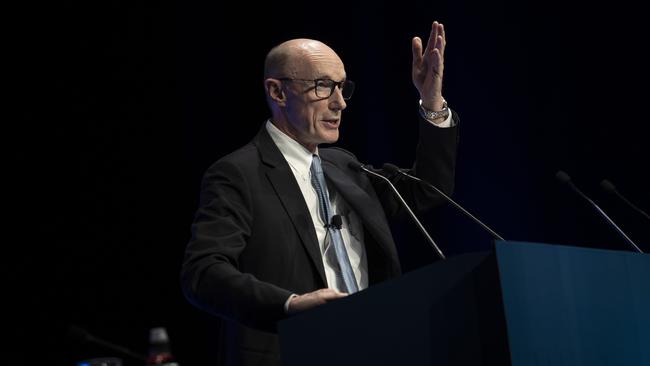Household hardship, stress to get worse: ANZ’s Elliott
The bank’s chief Shayne Elliott is bracing for household hardship to increase as it monitors borrowers in or close to negative equity.

ANZ Bank is bracing for household hardship and stress to worsen in the coming months, with the lender monitoring borrowers in or close to negative equity and suggesting it is already persuading some to sell up and repay their debt.
Chief executive Shayne Elliott on Thursday told shareholders at the bank’s annual meeting that while households were coming into the challenging environment in strong shape, it was preparing for the impact of higher rates and inflation to hit more of its customers.
“I can’t over emphasise the impact that cost-of-living pressures are having in the community,” he said.
“Our focus is on those customers most exposed to stress, those with less secure employment, those who possibly bought homes right at the peak of the cycle, those more exposed to cost of living increases or those who have suffered other shocks like family breakdown or illness,” Mr Elliott said.
The lender is keeping a close watch on the financial health of its borrowers, he added.
“One of the great lessons of Covid was the value of data and the ability to analyse these stresses at a granular level and proactively intervene,” he said.
“We can quickly identify home loans that are already in, or approaching, negative equity, actively monitor and help them as needed.”
In some cases, the bank is encouraging loan deferrals or refinancing. But chairman Paul O’Sullivan suggested the lender is, at times, encouraging borrowers to sell their home and repay their debt.
“Our approach is to proactively look at our customer data and to see can we identify and contact customers who we think might be heading for some stress,” Mr O’Sullivan said.
“And we have a number of options when we do that. Things like loan deferrals or recapitalising the loan, or indeed, in some cases, we may be best placed to persuade the customer it might be time to make a difficult, but important, change.”
Mr Elliott added that it was likely hardship would increase in the near term “as things get tough for many in the community”.
The CEO and chairman faced a barrage of questions from shareholders concerned about ANZ’s climate policies and ongoing lending to the fossil fuel industry, as climate group Market Forces accused Mr O’Sullivan of misleading investors on a resolution focused on ANZ’s lending to the fossil fuel industry.
“You made the comments in relation to items five and six that those who have lodged this resolution are seeking an immediate withdrawal of financing for companies that continue to have any exposure to fossil fuels. That is not the case,” Market Forces founder Julien Vincent said.
“The resolution actually, if you open up the notice of meeting, seeks clarity from the bank on how its financing will not enable the expansion of the fossil fuel industry.
“I believe that you knew this. I believe that you’ve read the resolution, you must have been across the material. And so I’d like to give you the opportunity … to correct the misleading statement that you made at the beginning of this meeting.”

In response, Mr O’Sullivan said there was “no desire or intent to mislead on (his) or the bank’s part”.
But Market Forces raised concerns that ANZ’s apparent mischaracterisation of the resolution “turned off investors who may have otherwise supported it”, with the climate group telling The Australian it was also considering pursuing whether the bank’s characterisation of the resolution had breached any Australian corporation and consumer laws, as well as ASIC and ASX rules.
Mr O’Sullivan defended ANZ’s action on climate in response to numerous questions from concerned shareholders.
“We are very alive to the risks associated with climate change. That’s precisely why we have the policies that we do. We think there are a number of risks associated with it,” Mr O’Sullivan said.
In response to a question from fund manager Geoff Wilson, who is leading a campaign against Labor’s proposed changes to franked dividends, Mr Elliott said it was an area the bank was focused on and concerned about.
Mr Wilson has argued that the proposed changes will reintroduce double taxation of corporate profits by stealth and increase the cost of capital for Australian corporates.
At the same meeting, Mr Elliott spruiked the benefits of ANZ’s proposed $4.9bn acquisition of Suncorp Bank, saying it would provide a platform for the lender to invest and grow in Queensland to the benefit not just of employees and customers, but also the state overall.
But in response to a shareholder question, Mr O’Sullivan declined to guarantee ANZ’s Queensland-based employees and branches won’t face the chop if the lender’s acquisition of Suncorp Bank goes through.
This is despite the lender committing to no net Suncorp job losses or branch closures for a three-year period, if the deal is waved through by regulators.
“No, we’re not going to extend that guarantee (to ANZ employees) … Our commitment is to do the best we can to respond to the changing needs of customers and to redeploy as many of our people when they are impacted by things like branch closures,” he said.
The lender’s pitch on the Suncorp acquisition included that it will use lessons learned from its takeover of the National Bank in New Zealand nearly two decades ago.
The 2004 acquisition of the National Bank in New Zealand had proved successful for both customers and shareholders and would be used as a blueprint for the Suncorp takeover, Mr Elliott added.
Mr Elliott’s comments come days after the Melbourne-based bank put forward its arguments to be given the go-ahead in its merger authorisation application to the competition regulator, saying the sector had “numerous competitors and new entrants” and that the combination of ANZ and Suncorp banks wouldn’t “materially alter” the former’s market share or significantly increase concentration in any market.
ANZ shareholders voted on a number of resolutions at the meeting, including the adoption of the remuneration report and the granting of restricted rights and performance rights to Mr Elliott, both of which passed.
In a separate scheme meeting held in the afternoon, shareholders voted on the proposal to establish a non-operating holding company (NOHC) as the new listed parent company of the ANZ Group and to separate ANZ’s banking and non-banking businesses within the group.
Mr Elliott said the NOHC structure was an exciting development that would provide the lender with greater flexibility and allow it to better meet customers’ needs.
At the same meeting, ANZ chairman Paul O’Sullivan said the proposed structure would allow the bank’s non-banking businesses, such as its joint venture with Worldline, “to operate on a more level playing field with other companies, while at the same time maintaining an appropriate regulatory environment for the bank as a whole”.
ANZ shares closed down 0.5 per cent at $23.90.






To join the conversation, please log in. Don't have an account? Register
Join the conversation, you are commenting as Logout